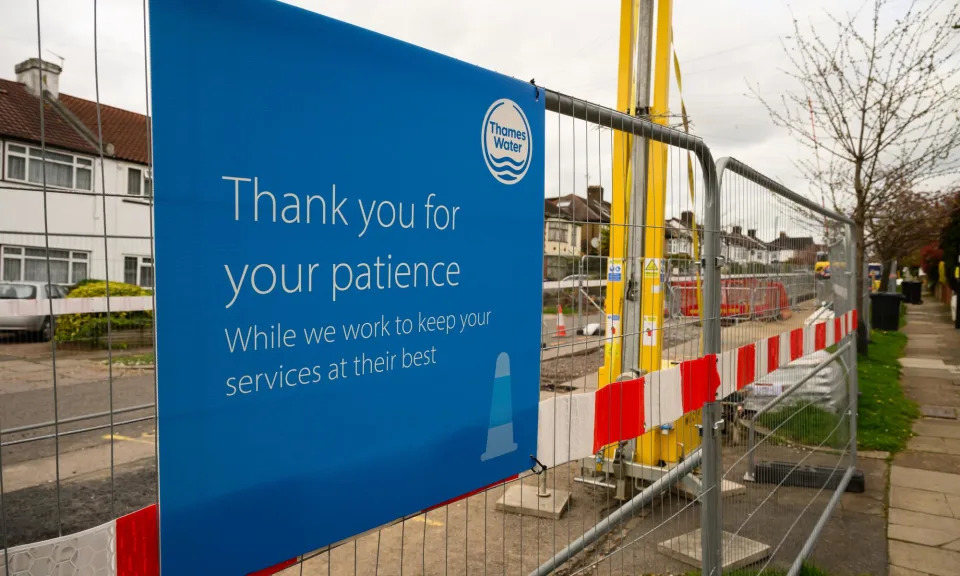Céline LE PRIOUX
Wed, 17 April 2024

Bjoern Hoecke, the head of the far-right AfD party in Germany's Thuringia state, faces accusations of using a banned Nazi slogan (Ronny HARTMANN)
He is a former history teacher who is gunning to become the first far-right state premier in post-war Germany. But first, Bjoern Hoecke will have to appear in court on Thursday for publicly using a banned Nazi slogan.
Hoecke, 52, is the head of the far-right Alternative for Germany (AfD) party in Thuringia, one of three former East German states where the party is leading opinion polls ahead of regional elections in September.
He stands accused of twice using the phrase "Alles fuer Deutschland" ("Everything for Germany"), once a motto of the so-called Sturmabteilung paramilitary group that played a key role in Adolf Hitler's rise to power.
The phrase is illegal in modern-day Germany, along with the Nazi salute and other slogans and symbols from that era.
The former high school teacher claims not to have been aware that the slogan "Everything for Germany" had been used by the Nazis, but prosecutors believe Hoecke uttered the phrase in full knowledge of its "origin and meaning".
The trial in the central city of Halle, set to last until mid-May, is one of several controversies the AfD is battling ahead of EU elections in June and regional elections in the autumn.
If convicted, Hoecke faces up to three years in prison. Following a guilty verdict, he could still stand in the regional election, but only if he engages in a drawn-out appeals process.
- 'Memorial of shame' -
Founded in 2013, the anti-Islam and anti-immigration AfD saw a surge in popularity on its tenth anniversary last year, seizing on concerns over rising migration, high inflation and a stumbling economy.
But its support has wavered since the start of this year as it battles scandals including allegations that senior party members were paid to spread pro-Russian positions on a Moscow-financed news website.
Considered an extremist by German intelligence services, Hoecke is one of the most controversial AfD personalities, having called Berlin's Holocaust monument a "memorial of shame" and urged a "180-degree shift" in the country's culture of remembrance.
At the trial on Thursday, Hoecke will have to answer to two charges.
He first stands accused of using the banned slogan at an election rally in Merseburg in the Saxony-Anhalt state in the run-up to Germany's 2021 federal election.
Then, at an AfD meeting in Thuringia in December, he allegedly shouted, "Everything for..." and incited the audience to reply: "Germany".
Born in western Germany near the city of Dortmund, Hoecke grew up in a right-wing family -- under the influence of his paternal grandparents, who were expelled from East Prussia when it was conquered by the Soviet Red Army in 1945.
The father-of-four later settled in Thuringia, where he became one of the founding members of the AfD in spring 2013 and local party chairman three months later.
In 2014, the AfD entered the state parliament in Thuringia with 10.6 percent of the vote and Hoecke became head of the party's parliamentary group -- a position he still holds today.
- Image problem -
Germany's domestic security agency has labelled the AfD in Thuringia a "confirmed" extremist organisation, along with the party's regional branches in Saxony and Saxony-Anhalt.
However, Johannes Kiess, a political scientist at the University of Leipzig, said the outcome of the trial was unlikely to dent support for Hoecke in Thuringia.
AfD supporters in the region are "convinced that the democratic institutions are out to get him", Kiess told AFP.
"It could even be good for him, because the media are talking about him," he said.
But the trial could sway voters in western Germany because it risks "damaging the party's image", Kiess continued.
"Potential voters do not want to be associated with this kind of statement."
Hoecke has been working to clean up his image ahead of the EU elections.
At a television debate last week with the conservative Christian Democratic Union party's candidate for Thuringia, Hoecke repeatedly argued that he had been misinterpreted when taken to task over some of his most controversial claims.
Among them was the party's concept of "remigration" -- short-hand in far-right circles for the mass expulsion of immigrants.
Instead, Hoecke argued that his party was seeking to bring back Germans living abroad.
clp-fec/hmn/spb/rlp/lb























